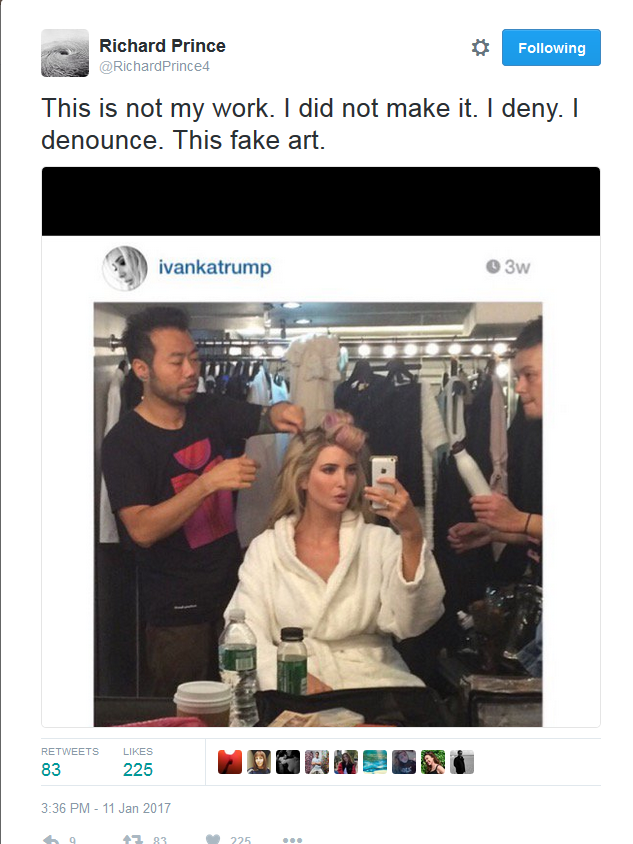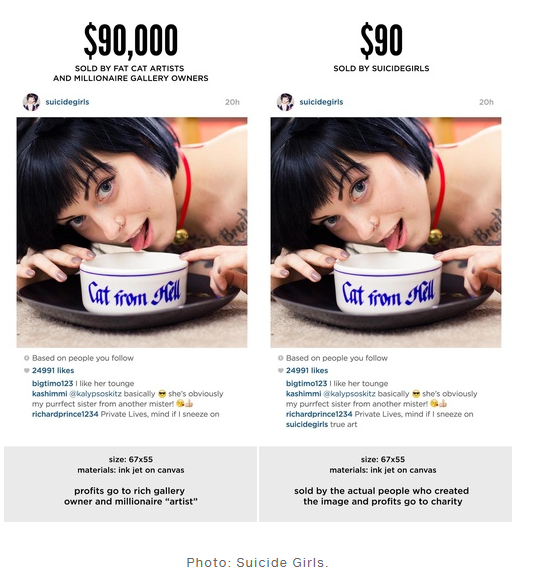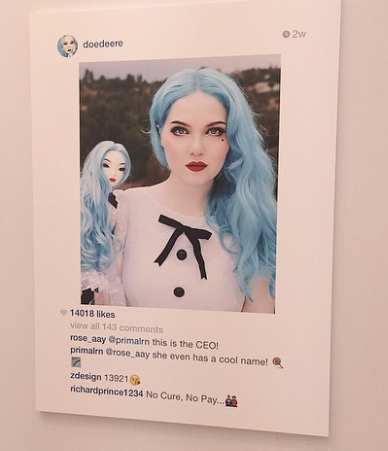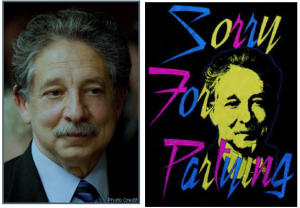There has been much discussion about the impact of the Presidential election on the art market, amidst much generalized anxiety about "fake news." What about "fake art?" Never one to be behind the curve, artist Richard Prince has stepped into the spotlight (to the extent he left). Declaring that one of his controversial “New Portraits” works of Instagram posts of others that was sold to Ivanka Trump is “fake” and that he “denounce[s]” it, Prince raises interesting questions about what the legal ramifications of such a repudiation might be. In this instance he has apparently refunded Ms. Trump’s money, but following on last year’s surprising Peter Doig trial (surprising that it got to trial, not that Mr. Doig won), a hypothetical artist making such a declaration might have some vulnerability under both common law, if not under the Visual Artists Rights Act of 1990, 17 U.S.C. § 106A (VARA).
Fake News, Fake Art? Richard Prince Disavows Work Depicting Ivanka Trump
Topics: Richard Prince, Patrick Cariou, Visual Artists Rights Act of 1990, Art Market Monitor, VARA, Twitter, 17 U.S.C. 106A, Ivanka Trump
Here We Go Again? Richard Prince Sued By Photographer Over Images of Rastafarian in Instagram Show
A new year, a new Richard Prince appropriation and fair use dispute. Readers will recall both the controversial 2013 Second Circuit decision on Prince’s dispute with Patrick Cariou over the latter’s Yes, Rasta photographs that Prince altered, defaced, and otherwise rearranged for his Canal Zone series. Last year Prince raised the profile of this provocative exploration of the bounds of copyright with the high profile “Instagram” show in which he enlarged Instagram posts and sold them for north of $90,000 each. Prince has now been sued for copyright infringement by photographer Donald Graham, whose image was used in one of those works. Will this be more of the same, or will Prince suffer a reversal of fortune? Even adopting a liberal interpretation of the 2013 opinion, it looks from here like he may have a problem, but the final word will almost certainly not come for quite some time.
Topics: Cariou v. Prince, Richard Prince, Second Circuit, Instagram, Larry Gagosian, Fair Use, Rastafarians Patrick Cariou
Google Books, Fair Use, and Visual Art—Second Circuit Writes Decision That Would Have Helped Two Years Ago
With much anticipation, the Second Circuit issued its opinion last week in the Google Books case (Authors Guild et al. v. Google, Inc.), brought by authors Jim Bouton (of Ball Four fame) and others against Google for the latter’s program of scanning millions of library books, whether or not those books are in the public domain. My overwhelming reaction to the opinion, however, in the realm of visual art, is what a lost opportunity the Prince v. Cariou decision was two years ago, and some optimism that the most recent decision will start to provide useful guidance for practitioners that has been harder to give with confidence since Prince. After two years of the preeminence of the first fair use factor threatening to dwarf everything with a “transformativeness” test that essentially any use could meet, Google Books (even while finding a fair use) restores some balance to that analysis.
Topics: Richard Prince, Campbell v. Acuff-Rose Music, Hildebrand Gurlitt, 510 U.S. 569, Teenage Mutant Ninja Turtle, Prince v. Cariou, Second Circuit, Canal Zone, Patrick Cariou, Toward a Fair Use Standard, Michelangelo, Suicide Girls, Inc., Google Books, The Legal Guide for Museum Professionals, Pierre Laval, Jim Bouton, Copyright, transformativeness, Fair Use, Nazi-Looted Art: Risks and Best Practices for Muse
Shepard Fairey Wanted on Vandalism Charge for Street Art in Detroit—Will This be the VARA Test Case?
Detroit police have issued a warrant for well-known artist Shepard Fairey in connection with his recent visit to the city, on suspicion of vandalism. While Fairey was apparently in Detroit to paint a commissioned mural at One Campus Martius, he told the Detroit Free Press, “I still do stuff on the street without permission. I'll be doing stuff on the street when I'm in Detroit.” According to the Free Press:
Topics: Richard Prince, Jeff Koons, Patrick Cariou, Moral Rights, Andre the Giant, Graffiti Art, Visual Artists Rights Act of 1990, Barack Obama, One Campus Martius, Banksy Does New York, VARA, Banksy, Shepard Fairey, appropriation copyright, Copyright, 5Pointz, Hope, Detroit Free Press, Associated Press, Fair Use
Richard Prince, Social Media and the Public Domain: Reports of Copyright’s Demise are Premature
Reactions to the Richard Prince Instagram story continue to filter in, and highlight the perpetual confusion between what is publicly available and what is in the public domain. They are not the same thing, with important legal consequences.
Topics: Richard Prince, Missy, Copyright Act, Prince v. Cariou, Canal Zone, Patrick Cariou, Suicide Girls, vulture.com, Yes Rasta, 17 U.S.C. § 107, Jerry Saltz, Instagram, Copyright, transformativeness, Fair Use, ArtNet, New York Magazine, § 107
Fair Use Fool me Twice, Shame on Me—Richard Prince Goes Trolling on Instagram But May Have a More Pedestrian Problem
Few art law cases have received as much attention as that of Richard Prince and his dispute with Patrick Cariou over the latter’s Yes, Rasta photographs that Prince altered, defaced, and otherwise rearranged for his Canal Zone series. Prince has now garnered renewed attention for his appropriation of Instagram images in a set of works he has been selling at a Gagosian Gallery show called “New Portraits" (and in various other venues over the last few months). He escaped liability for infringement of Cariou’s pictures (though the case settled after remand; several infringement claims were still in play when the parties settled). Can he do so again? If this recent effort is not infringement, it certainly begs the question of whether the fair use exception has swallowed the rule. Lastly, Instagram itself may have prohibited the entire exercise in its terms of use, a possible avenue to short-circuit the entire copyright exercise.
Topics: Richard Prince, Copyright Act, DoeDeere, 2LiveCrew, Prince v. Cariou, Roy Orbison, Canal Zone, Patrick Cariou, Internet, Yes Rasta, 17 U.S.C. § 107, Instagram, Copyright, Gagosian Gallery, transformativeness, Fair Use, § 107
Fair Use and Transformativeness Pushback: Seventh Circuit Takes a Swipe at “Lazy Appropriators”
Much ink has been spilled over the new world order seemingly announced by last year’s Second Circuit decision in Prince v. Cariou with regard to copyright, fair use, appropriation art, and “transformativeness.” In a nutshell, while roundly criticized, most commentators have taken the Prince decision to announce the apotheosis of “transformativeness” among the fair use factors in § 107 of the Copyright Act. Prince looked at the four statutory factors and applied them in such a way that to be considered “transformative” was to qualify for fair use. Most troubling was the “know it when you see it” character of the opinion. The Google Books opinions took a similar view.
Topics: Richard Prince, Cheshire Cat, Copyright Act, 17 U.S.C. §106, Seventh Circuit, Prince v. Cariou, Mifflin Street Block Party, Google Books, Campbell v. Acuff Rose, Wisconsin, Sorry for partying, Madison, Copyright, Kienitz v. Sconnie Nation LLC, Judge Frank Easterbrook, First Amendment, transformativeness, Fair Use, mayor Paul Soglin, 17 U.S.C. §107
Can Copyright Aid Kate Upton, Jennifer Lawrence, and Other Victims of Celebrity Photo Hack?
As anyone with a computer now knows, the story broke last week of a supposed cache of hundreds of intimate photographs of numerous celebrities, including Kate Upton and Jennifer Lawrence, and Detroit Tigers pitcher Justin Verlander. Over the course of the week, rumors circulated about who, exactly, had them, and whether or where they would be leaked online. The story also raised important questions about privacy, security, and default cloud storage of which many people were simply unaware.
Topics: The Showroom, Richard Prince, U.S. Copyright Office, reddit, rights of publicity, Second Circuit, No Delete, Canal Zone, Jennifer Lawrence, Patrick Cariou, Florida, Detroit Tigers, Yes Rasta, Saint Petersburg, Jeff Hamilton, Kate Upton, Cory Allen Contemporary Art, selfie, photo hack, Justin Verlander, XVALA, Copyright, First Amendment, Fair Use, Warehouse Arts District, Art Law Report
Free Speech, Fair Use, and Meaning—Recapping An Evening of Copyright and the Visual Arts at the Sotheby’s Institute
Last night was a fascinating evening at the Sotheby’s Institute in New York, where Judith Prowda was celebrating the launch of her new book Visual Arts and the Law (Lund Humphries 2013). The book, not at all incidentally, is a must-have.
Topics: free speech, Richard Prince, Amy Adler, Campbell v. Acuff-Rose Music, Judith Prowda, Canal Zone, Patrick Cariou, Lund Humphries, Boies Schiller, American Society of Media Photographers, Yes Rasta, Kirkland & Ellis, NYU Law School, Events, Picture Archive Council of America, Shepard Fairey, Dale Cendali, Copyright, Hope, Visual Arts and the Law, transformative, First Amendment, Associated Press, Sotheby’s Institute, Fair Use
Cariou Petitions Supreme Court to Review Richard Prince Fair Use Decision
Patrick Cariou, after winning his copyright claim against Richard Prince in the District Court in 2011, suffered a stinging reversal earlier this year when the Second Circuit found in Prince’s favor as to his use of Cariou’s Yes, Rasta series in the Prince Canal Zone collages. The Second Circuit decision has been widely derided by copyright analysts, who apart from the relative merits of Cariou vs. Prince found the decision unclear as guidance to future artists and copyright holders. For the Art Law Report’s coverage of the case, click here.
Topics: Cariou v. Prince, Richard Prince, Roy Orbison, Canal Zone, Patrick Cariou, Campbell v. Acuff Rose Music Inc., Yes Rasta






